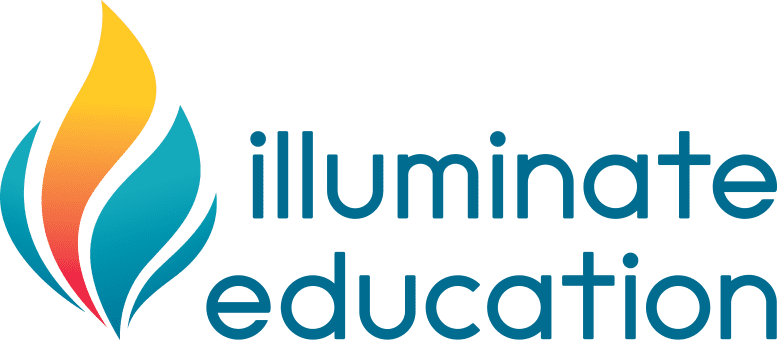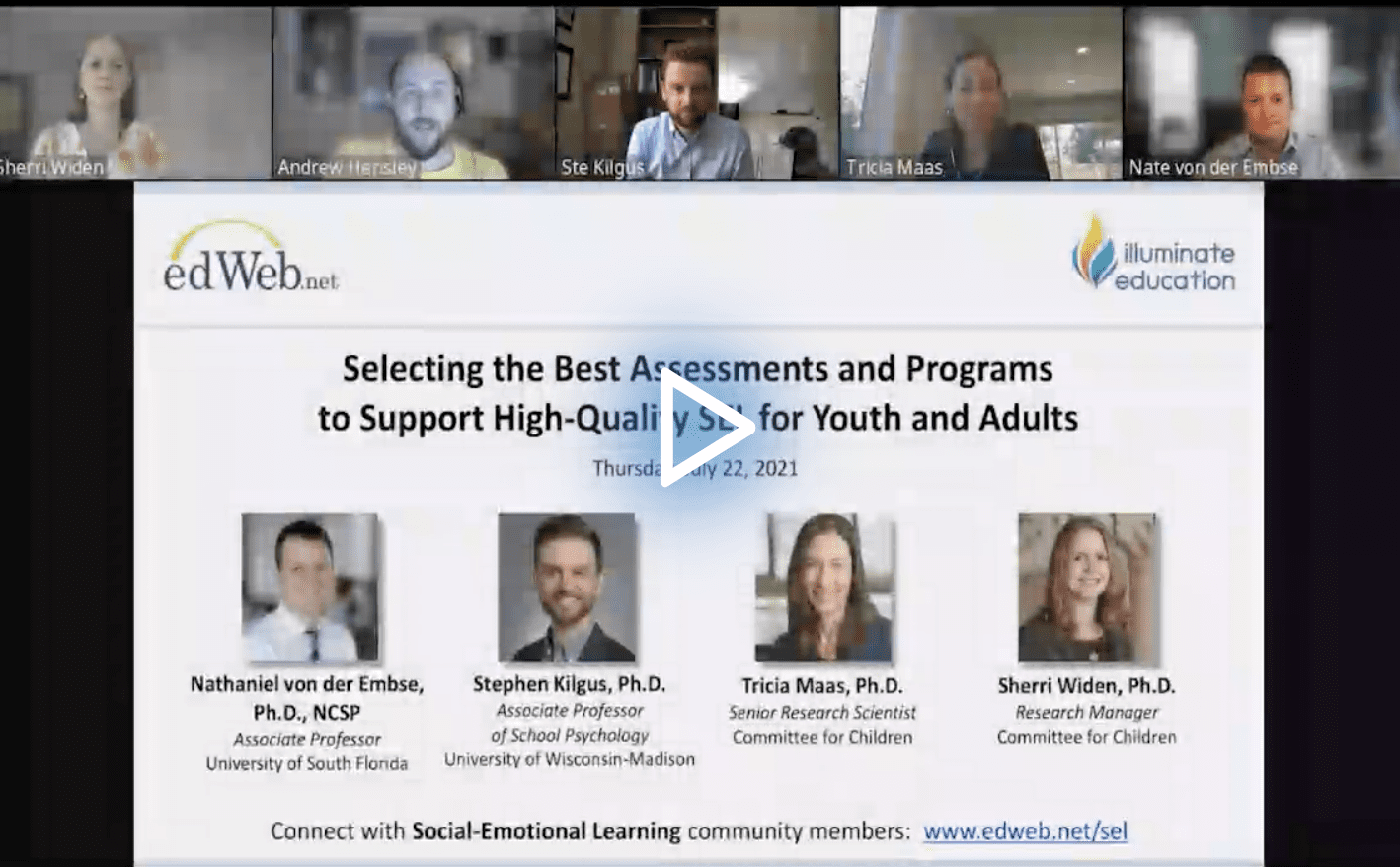Getting Ready for SEL: Tips for Effective Programming
Blog post by Michele Israel based on this edLeader Panel
Social-emotional learning (SEL) is all the rage in schools around the country, as it should be. It shapes children’s, youth’s, and adults’ knowledge, skills, and attitudes crucial to human development and education.
For SEL programs to succeed, their implementers should consider several critical elements that make for high-quality initiatives. In a recent edLeader Panel, sponsored by Illuminate Education, leading SEL experts described the selection, implementation, and assessment factors necessary for efforts to provide maximum benefit.
Begin with an SEL Framework
While SEL is gaining popularity, it mustn’t turn into a meaningless catchphrase resulting in programs that don’t reflect the rich SEL process. If designed and implemented appropriately, programs enable people to develop healthy identities, manage emotions and personal and collective goals, feel and show empathy for others, establish and maintain supportive relationships, and make responsible and caring decisions.
A starting place for effective SEL programming is the Collaborative on Academic and Social Emotional Learning (CASEL) Framework, centered on five social-emotional skills: self-management, self-awareness, social awareness, relationship skills, and responsible decision-making. Four key settings—classrooms, schools, families and caregivers, and communities—promote the competencies and advance learning and development.
Making SEL Systemic
Dr. Sherri Widen, Research Manager for Committee for Children, noted SEL programs are best delivered across contexts, making them systemic.
“The framework for systemic SEL,” explained Dr. Widen, “emphasizes that communities attend to adult SEL, schoolwide SEL programs, and a continuous improvement approach. This framework describes a process with four central elements that can be addressed at school, district, and state levels.”
Moving toward systemic SEL calls for:
- Engaging all stakeholders-teachers, counselors, parents, community members, etc., to establish a shared vision.
- Supporting educators’ and other adults’ SEL skills to enhance their well-being to become SEL role models and teachers.
- Adopting a program to strengthen children’s and youth’s SEL skills.
- Establishing continuous improvement processes to ensure the SEL program is working as envisioned.
Initiatives for Adults
Because adults have a critical part in setting contextual conditions in schools, said Dr. Tricia Maas, Senior Research Scientist at Committee for Children, school staff need an environment that nurtures their social and emotional competence and capacities and supports their well-being.
Adult SEL offerings can help educators address emotion and stress management, perspective taking, relationship skills, and burnout; develop and sustain healthy student-teacher relationships; enhance classroom conditions to promote positive outcomes, inclusion, and a sense of belonging; deliver effective SEL lessons; implement SEL programs using a variety of approaches; and engage in professional learning.
Dr. Maas described steps school districts can take to implement adult SEL initiatives that achieve these results. Leaders should consider:
- Supporting educator buy-in early in the SEL adoption process, ensuring that adult efforts are different from students, offering a pilot to garner interest from a smaller group of teachers toward broader adoption.
- Implementing SEL through continuous communication with stakeholders, integrating programs with other initiatives, and establishing and using continuous learning systems.
- Modeling SEL competencies for educators and staff, which requires everyone in the district community to be engaged with SEL programming.
Student-Facing SEL
Dr. Maas noted that in the last few years, SEL programs have received more attention. Research of SEL programming has propelled this interest, highlighting quality initiatives. Education leaders, when exploring the myriad programs available, should take the following steps to ensure program success:
- Determine whether programs are based on research and evidence demonstrating their effectiveness. Certain factors particularly stand out in efforts that work. Such programs have:
- “SAFE” features:
- Intentionally sequenced in a logical progression
- Active learning to help children gain skills and knowledge
- Focus on developing social-emotional skills
- Explicit about the competencies they aim to develop
- More significant impacts when learners engage with them over several years and provide regular practice opportunities.
- Been developed through an iterative process with educators and students, ensuring they are relevant, user friendly, and incorporate schools’ and classrooms’ realities.
- Undergone extensive evaluations and have demonstrated benefits. (CASEL has program guides that provide insight into evidence-based SEL programs.)
- “SAFE” features:
- Consider programs’ contextual fit in support of equity advancement in their communities, reinforcing feelings of inclusion, belonging, and social justice.
- Ensure that initiatives’ language and frameworks are consistent with other programs in the school community.
- Review resourcing and other capacity considerations, such as implementation readiness, systems to support data collection, continuous improvement, and program costs.
Implementation strategies for student SEL programs are the same as those for adult efforts but also include:
- Consistent reinforcement across the school environment
- Integration with students’ academic work
- Modeling and practicing in the context of school-based relationships
- Continuous improvement resulting from data collection (surveys, focus groups, formative assessments) and analysis revealing program impact on students’ skills and competencies
SEL Assessment
Assessment is integral to systemic SEL programming, explained Dr. Stephen Kilgus, an associate professor in the school psychology program at the University of Wisconsin-Madison. Universal screening, he noted, is a vital tool for determining how students and adults fare in and benefit from SEL programs. It also functions as a measure of SEL programming efficacy.
“If we find over time that universal screening scores are improving,” Dr. Kilgus explained, “we can have greater confidence that our universal SEL programming is having its intended effect and supporting all students within the school or as close to all as possible.”
It’s best to match the tool to a school’s specific circumstances. To make that match, watch for:
- Technical adequacy – Screening scores should yield reliable data consistent across administrations over time and items within the tool.
- Validity – The screener measures a specific SEL aspect or function, with findings that can predict research- and evidence-based behavior.
- Diagnostic accuracy – The tool reliably differentiates students who need social-emotional support from those students who do not.
- Fairness and equity in screening scores – The tool does not over-identify certain populations.
- Usability and feasibility – The tool does not take much to administer and should be relatively low cost, and yields interpretable scores and reports that inform decision-making.
- Contextual fit – The screener aligns with other constructs of interest in the school community and with grades, age, and student languages.
- Service delivery model – The tool should help educators quickly determine the level of support students will need.
Before any assessment takes place, schools should consider screening readiness for collecting data to inform SEL programming. Dr. Nathaniel P. von der Embse, an associate professor of school psychology at the University of South Florida, recommended schools do the following to be assessment ready:
- Identify what will be accomplished with the data and how they will inform the improvement and promotion of student equity.
- Examine current capacity through resource mapping; know where the gaps are in existing intervention services and current programming.
- Examine barriers to sustainability.
- Determine how often the school will screen.
- Decide what to do with discrepant data.
- Determine who will be the primary informants.
The impact of SEL can be long lasting, but it needs to be just right. Thoughtful planning, implementation, and assessment can shape initiatives that genuinely enhance people’s lives.
This edWeb broadcast was sponsored by Illuminate Education.
Watch the Recording Listen to the Podcast
About the Presenters
Nathaniel P. von der Embse, Ph.D. is an associate professor of school psychology at the University of South Florida. Dr. von der Embse serves as an associate editor for the Journal of School Psychology, and his research interests include universal screening for behavioral and mental health, teacher stress and student test anxiety, and training educators in population-based mental health services. He received the 2018 Lightner Witmer Award for early career scholarship from Division 16 of the American Psychological Association. He is one of the authors of the Social, Academic, and Emotional Behavior Risk Screener (SAEBRS) assessment suite and is an author and behavior team member with FastBridge.
Dr. Stephen Kilgus is Associate Professor in the School Psychology Program at the University of Wisconsin-Madison where his research primarily relates to social-emotional and behavioral assessment. His work has resulted in the development of evidence-based assessment procedures, as well as the validation of tools for universal screening, problem analysis, and progress monitoring. Dr. Kilgus has authored and contributed to the development of a number of assessments, including the SAEBRS screener and Direct Behavior Ratings (DBRs). He currently serves as a principal investigator on a grant from the Institute of Education Sciences (IES) regarding the validation of the Intervention Selection Profile (ISP), a suite of tools to inform the selection and modification of Tier 2 targeted interventions. Dr. Kilgus is also researching the development and evaluation of Tier 2 targeted interventions.
Dr. Tricia Maas is a senior research scientist at Committee for Children where she leads research for the organization’s Second Step® SEL for Adults and Second Step® Out-of-School Time programs. Prior to her career in research, Dr. Maas taught high school math in Charlotte, NC and San Jose, CA. Dr. Maas holds an M.A. in education policy from Stanford University, and a Ph.D. in education policy from the University of Washington.
Dr. Sherri Widen’s expertise is the development of children’s concepts of emotions and social-emotional skills. In 2013, she transitioned from basic research in psychology to more applied research in education settings with a focus on increasing children’s social-emotional skills to support their academic outcomes. Dr. Widen has been the manager of research at Committee for Children since 2018 where she contributes to readership and thought leadership on the Second Step social-emotional learning classroom intervention and on products to support families to engage in social-emotional learning at home. Dr. Widen holds a B.A. in psychology and an M.A. in developmental psychology from the University of British Columbia, and a Ph.D. in developmental psychology from Boston College.
Join the Community
Social-Emotional Learning is a free professional learning community on edWeb.net where educators can collaborate and share ideas, examples, and resources for incorporating social-emotional learning in the classroom.

Michele Israel writes about the ideas and best practices that are shared in edWeb’s edWebinars so they can spread innovative and best practices to the education community. Michele owns Michele Israel Consulting, LLC, which serves large and small educational, non-profit, media, corporate, eLearning, and blended learning organizations to bolster products and programs. Her rich career spans over 25 years of successfully developing educational materials and resources, designing and facilitating training, generating communication materials and grant proposals, and assisting in organizational and program development. In addition to lesson plans and other teacher resources, Michele’s portfolio includes published articles covering a range of educational and business topics.




Comments are closed.